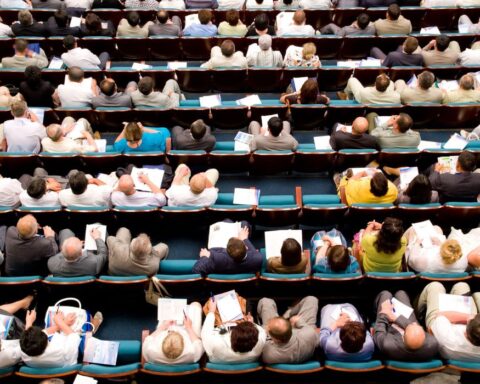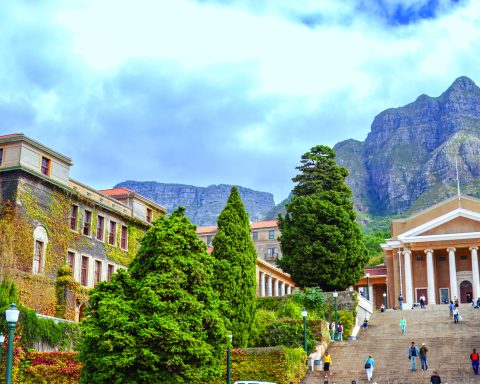High school activist Sophia Bi, 16, has a message for Canada’s 13 ministers of education.
“Climate change is an emergency, and we need to start teaching it as one,” says Bi, a Grade 11 student at Lord Byng Secondary School in Vancouver. “To do that means our education system must reflect that and prepare students to face the climate emergency.”
Like Bi, fellow student activists, teacher unions and policy analysts are calling on education leaders to integrate sustainability and climate change education into elementary and secondary school curricula, enabling students to think critically about the global emergency.
“We need every single level of education, every single stakeholder and player in the field to make it a priority,” says Hilary Inwood, co-chair of a national network of education faculty members focused on embedding environmental and sustainability topics in teacher training. Inwood, who also leads the Ontario Institute for Studies in Education’s environmental and sustainability initiative, says that “education is critical in helping make the cultural shift towards sustainability that is required.”
At best, K–12 sustainability and climate change education is “uneven,” according to researchers. “We have a responsibility, especially for those who are educators, to be honest with young people about the reality of the urgency we are facing,” says Ellen Field, an assistant professor in Lakehead University’s education faculty.
“Our education system must prepare students to face the climate emergency.”
— Sophia Bi,
Climate Education Reform BC
Awarded a Social Sciences and Humanities Research Council fellowship to explore teacher literacy about climate change, Field is co-author of an upcoming analysis of Grades 7 to 12 curricula that shows wide variations in climate-related learning expectations, with content found more in elective than mandatory courses.
Knowing climate change facts is insufficient, Field adds. “This curriculum must also provide a focus on solutions and help students develop the skills and initiative to lead solutions.”
That imperative to train the next generation of agents of change is widely shared by those pressing for holistic, climate-relevant curricula and teacher education.
Among those calling for change is the Canadian Teachers’ Federation, which has joined with a global network urging that climate change education be taught from a scientific and civic action perspective. “What we teach matters,” declared Education International president Susan Hopgood in announcing the campaign in April. “We must inspire students and communities to action.”
Mind the climate change education gap
Canadian researchers have identified system-level gaps in teaching and learning about climate topics.
In 2020, a study by the University of Saskatchewan’s Sustainability and Education Policy Network (part of an international research collaboration on global climate education) found that provinces and territories mention education in climate policies, such as energy efficiency upgrades for school buildings. By contrast, only 46% of jurisdictions develop climate-relevant policies for the classroom, generating “shallow engagement” with content. “The indirect message to students is climate change does not matter,” the study authors conclude.
“There is a leadership gap, unfortunately, and there just isn’t the prioritization that we would like to be seeing,” says Nicola Chopin, project manager at the Sustainability and Education Policy Network. Current ministry education policies, she warns, are inadequate to meet the 2016 Paris climate change agreement.
But change is happening at the grassroots level. “I am excited about the momentum,” says Pamela Schwartzberg, president and CEO of Learning for a Sustainable Future (LSF), a national non-profit that promotes environmental awareness and social responsibility for students and teachers. In 2020/2021, LSF hosted webinars on outdoor learning and climate change for 5,000 teachers and, during the pandemic, switched its youth forums online for 4,000 students.
Schwartzberg applauds student activism on curriculum. “They will push the teachers,” she predicts. “It is why we are all in this together.”
In April, Sophia Bi and other student members of Climate Education Reform BC released a six-point “open letter” to the provincial education minister, recommending comprehensive revisions that explain climate change to all grades and support teacher training.
“The curriculum must also provide
a focus on solutions to help students develop the skills and initiative to lead solutions.”
— Ellen Field, assistant professor,
Lakehead University education faculty
This spring, Alberta Youth Leaders for Environmental Education (AYLEE) drafted recommendations for the provincial education ministry to similarly revamp the curriculum. “One of the biggest problems with the existing curriculum is that climate [topics] are not included, and there are even fewer mentions of climate change,” says AYLEE member Sneha Rose Jigo, 18.
About to graduate from Lacombe Composite High School, northeast of Red Deer, Jigo likens climate and energy literacy to reading and writing fundamentals. “We want people to know how to read and write, so we teach it in school,” she says. “We want people to know how to interpret information about energy and climate, so we should teach that in school.”
Helping teachers make the grade
One barrier to climate change literacy is teacher confidence.
“[For] the majority of teachers who aren’t talking about climate change in the classroom, it’s not that they disagree it is an important issue; it’s that they lack the understanding to speak confidently about it to their students,” observes Anne Corkery, a Grade 6 and 7 teacher at St. Anne Catholic Elementary School in Peterborough, Ontario.
Corkery, recipient of a 2020 LSF Earth Steward Teaching Award, says her background in biology helps her bring environmental issues to life for students. Two years ago, she designed an outdoor project for students to tap sap from maple trees in the local neighbourhood, creating an opening to discuss scientists’ warnings about the negative impact of rising temperatures on Canada’s iconic tree.
When a city official complained that tapping trees was harmful, Corkery urged students to research the accuracy of the claim. The students presented their findings in a letter to the mayor of Peterborough, who invited them to City Hall and accepted their invitation to attend a school pancake lunch, complete with homemade maple syrup.
“The best part was seeing the kids feel so empowered,” Corkery says. She would be “thrilled” if Ontario mandated a climate change unit in all subjects, but only if teachers received appropriate professional development.
In response, some education faculties have new offerings.
Lakehead offers an elective in climate change education in the Master of Education and Bachelor of Education programs and has a mandatory environmental education class in the Bachelor of Education program. OISE requires intermediate–secondary teacher candidates to take a 36-hour course on environmental and sustainability education, including climate change.
At the University of British Columbia, teacher candidates can specialize in sustainability issues. Currently, Department of Language & Literacy Education assistant professor Derek Gladwin is working with a colleague to design a mandatory course in environmental literacy (subject to ministry approval) for prospective teachers, with a version for graduate students being piloted this fall.
“The candidates are hungry for it,” Gladwin says. “They know they need to be equipped with it before they head out to the schools.”
That’s also the assessment of George Radner, executive director of Vancouver-based Be the Change Earth Alliance, a non-profit offering climate workshops for teachers and students. One challenge, he says, is that unlike in elementary school, high school courses take a discipline-specific approach to foster deep knowledge of a subject, making it more difficult to explore the social, political and scientific dimensions of climate change. “You need an integrated model to break through these siloed disciplines,” he says.
Greening education from the inside out
Environmental organizations recruit teachers but also work with school boards and provincial ministries. EcoSchools Canada, founded in Ontario but operating nationally since 2019, works with one million students a year to help them acquire knowledge and leadership skills by working on environmental and climate action projects at school. Through a voluntary, curriculum-linked certification program developed by EcoSchools, K–12 schools and their boards gather data to measure their sustainability progress.
“As we are certifying, we are collecting a lot of data from them,” says EcoSchools executive director Lindsay Bunce. “We can leverage that database to identify conditions for success, gaps and opportunities and really cross-pollinate the best practices across the country.”
At the Niagara Catholic District School Board, a long-time EcoSchool member in Ontario, 46 of 57 schools earn points for sustainability-focused activities. The board has pledged to reduce bottled water use and upgrade lighting and heating, with plans for a sustainability dashboard at each school.
“We want the kids to see what their school’s consumption looks like and compare it to other schools,” says the board’s controller of facilities services, Clark Euale. “It’s important for the board, from an environmental sustainability perspective, to reduce our carbon footprint.”
In New Brunswick, The Gaia Project, a non-profit that works with provincial education and environmental departments to deliver experiential learning projects, currently reaches about one-third of schools in the province.
“Climate change is not a debate anymore,” says The Gaia Project’s interim executive director, Geoff MacDonald. “With students, we want to give them an opportunity to take action instead of feeding fear … and provide them with solutions and make connections to carbon reduction.”
The urgency is not lost on students.
“As you learn more about the impacts [of climate change], you realize how disastrous it is going to be if we don’t act on it,” says Bi.
Jennifer Lewington is an intrepid reporter and writes regularly on many topics, including business school news.







